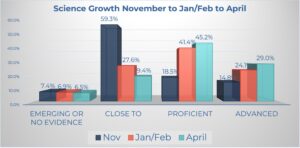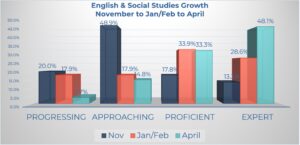Puzzle of Practice
Elgin Jr/Sr High School is a small community-based school that serves 7th-12th grade students in Elgin, Oregon. Post-pandemic, state test scores were not where teachers or students wanted them to be and the staff was experiencing some turnover.
Collective Goal
Elgin Jr/Sr High School set out to cultivate students who take ownership of their learning by implementing high-leverage instructional practices in the classroom. Elgin’s staff was determined to ensure their students know where they are headed in their learning and why, where they are currently with the learning goal, where they are headed next, and how they intend to get to the next step.
Collective Action
- The Elgin staff formed a Professional Learning Team in which several teachers sat with the principal to make decisions regarding the direction of adult learning in the building.
- Throughout the 2022-2023 school year, representatives from the Professional Learning Team (two teachers and the principal) attended five workshops to learn about Impact Teams and the formative assessment process with Katie Smith from The Core Collaborative.
- The teachers receiving initial training implemented the formative assessment process in their own classrooms. As they witnessed student ownership increase, they became champions of the work. They shared their results with the professional learning team and collaborated with the professional learning team to scale their training across the building.
- During the second semester of the 2022-2023 school year, teachers engaged in training (provided by the staff that attended the workshops concerning Impact Teams and the formative assessment process) on learning goals and the co-creation of success criteria Following this training, the school staff was encouraged to focus on increasing clarity in their classrooms by implementing these formative practices.
- Every other Wednesday, a challenge was posted in an online group (to which all staff belonged) by the principal. The challenge would: 1) share information around a formative practice (i.e. co-creating success criteria), 2) provide an external video link to an example, and 3) invite the staff to implement the practice, post a video of their practice in the online group, and provide feedback to a colleague’s video. Within weeks, all staff were participating in the Wednesday challenges.
- The Professional Learning Team engaged the faculty in learning walks to gather evidence about classroom practice.
- Student voice data was collected from students regarding their perception of what it meant to be a good learner and how they learn best.
- To further their learning, the school engaged nearly all Junior/Senior high school staff and their feeder elementary school in a two-day workshop in June of 2023. This summer workshop was led by Katie Smith and Isaac Wells from The Core Collaborative. During this workshop, Katie and Isaac worked with the staff to:
-
- co-create the characteristics of an Elgin Husky (or self-empowered learner),
- review student voice data to provide a base-line of where the students were concerning the desired characteristics of an Elgin Husky,
- unpack the learning dispositions the staff chose as essential to foster in their students so they had a common understanding of what it looked like and sounded like when students grew these dispositions,
- develop K-12 learning progressions for the various genres of writing and associate the models with each step in the learning progression,
- review high-leverage research-based instructional practices that are part of the formative assessment process,
- develop the goal for the 2023-2024 school year, which was to increase student ownership of writing by implementing formative assessment practices and cultivating the desired learning dispositions in the students, and
- identify what, when, and how we would monitor progress throughout the 2023-2024 school year.
- This school year (2023-2024), Katie Smith visited four times throughout the year (September, November, February, and April). During each visit, Impact Teams/PLC met on a rotating schedule to look at student work (evidence), analyze this work by performance level, and determine collective research-based actions in the classroom. They intentionally applied protocols at every meeting to monitor progress and articulate next steps.
- Science, English, and Social Studies teachers focused their collection of evidence and analysis on student writing, specifically CERs in science and argumentative writing in English and Social Studies.
- Math and elective teachers focused their collection of evidence on student demonstration of the targeted learning dispositions and observation evidence of implementing the formative practices in the classroom.
- Between each visit, the professional learning team kept the school focused on implementing the formative assessment process by continuing learning walks, posting and engaging in the Wednesday flip grid challenges, and reinforcing the instructional vision.
Collective Impact
Within a year and a half, the staff at Elgin High School has united around a common instructional vision of creating self-empowered students who have agency and ownership over their learning. This unification has led to an increase in staff morale and a “renewed passion for teaching” (Emily Sorensen, Chemistry & Health Teacher, Elgin Jr/Sr High School, 2024). Additionally, it has yielded common classroom practices throughout the school that are predominantly student-centered rather than teacher-centered.
Linked here you will see students in Chemistry comparing and contrasting a continuum of models to determine which example is the most aligned to the learning goal. At the end of the video, you will hear students providing feedback on the lesson, shedding light on the aspects of the lesson that helped them grow their understanding. In this very short clip concerning welding, one student demonstrates how to give peer feedback that communicates where their peer is in the learning process, where he needs to go next, and what he should do to reach this next step. Both videos demonstrate a shared pedagogical language that is heard in all classrooms and acknowledges students as partners in the learning process.
The graph below demonstrates the impact made by the Science Department regarding student performance with writing a claim, supporting it with scientific evidence, and providing reasoning to show how the evidence justifies the claim. Using a rubric aligned to state standards, 33% of Elgin’s Jr/Sr high school students demonstrated proficiency with this skill in November. By engaging the students with formative practices, 74% of students demonstrated they were proficient or above in April.

Elgin Jr./Sr. High Science Growth
Similar success was achieved by the students of the Social Studies and English teachers concerning argumentative writing. 31.1%of students produced proficient work according to the rubric in November and after engaging the students in co-creation of success criteria, annotation of models, deliberate practice, and self- and peer assessment, 81.4% had demonstrated they were proficient or above in the spring.

Elgin Jr./Sr. High ELA and Social Studies Growth
Transforming school climate and culture involves agreeing upon school values, defining the type of student you wish to cultivate, identifying the instructional practices that will yield this type of student, teaching the staff these instructional practices, coaching implementation of these practices, providing feedback on these practices, demonstrating and celebrating success, and sustaining momentum and a commitment to improvement. School reform is hard, but when asked if they would engage in this work again, here is what the staff Eglin Jr/Sr High School teachers said.

